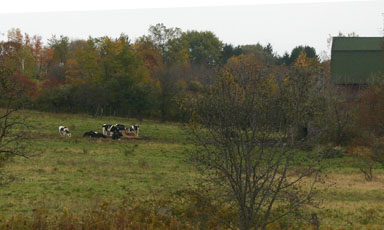October 21, 2009
Helping dairy farms in Dryden
When people think of farms in Dryden, they usually think of dairy farms and their supporting corn fields. (Dryden Dairy Day encourages that too!)
Dryden's dairy farms are vastly more productive than they used to be, and employ far fewer people. Thanks to an amazing continuing Cornell survey of the area (PDF), we have actual data on how much has changed:
Five times as much milk was sold in 2007 from dairy farms based in Dryden as was sold in 1917. Labor productivity in terms of milk sold per worker has increased 35 times in the century reflecting the great gains made from advances in agricultural technology. Dairy farm numbers have decreased from 206 in 1907 to 8 in 2007. Dryden's dairy farms continue as an important contributor to the economy of the Town.
We have 1/25th the number of dairy farms and a much smaller number of people working on them. While the study is correct that dairy farms make an important contribution, their immediate impact on Dryden residents are much smaller. We have 1/7 as many people working at dairy farms, while the population has tripled from 3590 to 13,500+.
That doesn't mean, however, that we should ignore dairy farming or just let it go. Our climate and soils are well-suited for use as pastures, the area has supporting infrastructure for dairy farming, and even though milk prices look terrible now, they don't always stay in the basement. I'm very glad that the Town of Dryden has been supporting applications for Purchase of Development Rights for farms that want them, preserving a lot of our best land while paying farmers for the privilege.
One other key possibility, for dairy as well as for other kinds of farming, is to work toward more local processing. I was delighted a few years ago to find delicious Wideawake Farms cheese curds at Dairy Day, and I understand there may be more of that coming in the future. Dairy farmers in particular constantly find themselves at the mercy of processors, who seem to claim larger and larger shares of the money consumers spend on food. This probably wouldn't involve the Town building infrastructure itself, but the Town might find ways to support such projects, helping with grant applications or connecting people with similar needs.
Articles in this series:
Note on photos
